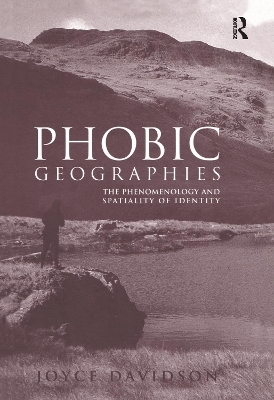
Phobic Geographies
The Phenomenology and Spatiality of Identity
Seiten
2003
Routledge (Verlag)
978-0-7546-3244-3 (ISBN)
Routledge (Verlag)
978-0-7546-3244-3 (ISBN)
Despite estimates that there are 10 million people in the UK suffering phobias, there is a gap in the literature and research on this topic. This text addresses this in relation to geography literature, but extends beyond this field to connect with phobic "others" whose ideas are reformed by fear.
Despite recent estimates that there are currently 10 million people in the UK suffering from phobias, there is a substantial and conspicuous gap in existing academic literature and research on this topic. This book addresses this gap in relation to geography literature, but also extending beyond this field to connect with a wide range of academics, health professionals and phobic 'others' whose ideas are (re)formed by fear. In doing so, it provides non-clinical, specifically geographical insights into phobia, of relevance for its sufferers and expands human geographical understandings of the relations between gender, embodiment, space and mental health, via a study of agoraphobia. This book argues that a critical geographic perspective is better placed to take account of the importance of wider social contexts and relations, and can give a fully spatialised account of the disorder more faithful to the way sufferers actually describe their experiences. By drawing attention to some of the more unusual ways that people relate to each other, and to their environments, we can illuminate some ordinarily taken for granted aspects of personal geographies.
Despite recent estimates that there are currently 10 million people in the UK suffering from phobias, there is a substantial and conspicuous gap in existing academic literature and research on this topic. This book addresses this gap in relation to geography literature, but also extending beyond this field to connect with a wide range of academics, health professionals and phobic 'others' whose ideas are (re)formed by fear. In doing so, it provides non-clinical, specifically geographical insights into phobia, of relevance for its sufferers and expands human geographical understandings of the relations between gender, embodiment, space and mental health, via a study of agoraphobia. This book argues that a critical geographic perspective is better placed to take account of the importance of wider social contexts and relations, and can give a fully spatialised account of the disorder more faithful to the way sufferers actually describe their experiences. By drawing attention to some of the more unusual ways that people relate to each other, and to their environments, we can illuminate some ordinarily taken for granted aspects of personal geographies.
Joyce Davidson, Lancaster University, UK
Contents: Introduction: notes on stories, selves and spaces; What in the world is agoraphobia?; 'Joking Apart...' the negotiation of group boundaries through humour; Fear and trembling in the mall: Kierkegaard and consumer/consuming spaces; 'Putting on a Face': Sartre, Goffman and agoraphobic anxiety in social space; A phenomenology of fear: Merleau-Ponty and agoraphobic life-worlds; Pregnant pauses: agoraphobic embodiment and the limits of (im)pregnability; 'All in the Mind?' analysing the subject of 'Self-Help'; Conclusion: re/solution of spatial identities; Bibliography; Index.
| Erscheint lt. Verlag | 28.7.2003 |
|---|---|
| Verlagsort | London |
| Sprache | englisch |
| Maße | 153 x 219 mm |
| Gewicht | 362 g |
| Themenwelt | Geisteswissenschaften ► Psychologie ► Sozialpsychologie |
| Naturwissenschaften ► Geowissenschaften ► Geografie / Kartografie | |
| Sozialwissenschaften ► Soziologie | |
| ISBN-10 | 0-7546-3244-X / 075463244X |
| ISBN-13 | 978-0-7546-3244-3 / 9780754632443 |
| Zustand | Neuware |
| Haben Sie eine Frage zum Produkt? |
Mehr entdecken
aus dem Bereich
aus dem Bereich
Buch | Softcover (2024)
Heyne (Verlag)
CHF 16,80


